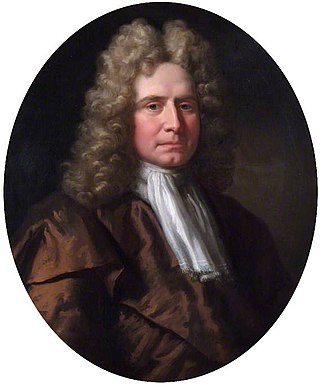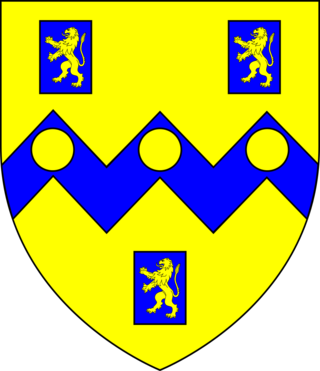Related Research Articles
Montagu Venables-Bertie, 2nd Earl of Abingdon PC, styled Hon. Montagu Bertie until 1682 and Lord Norreys from 1682 to 1699, was an English nobleman.
Sir George Beaumont, 4th Baronet of Stoughton Grange, Leicestershire was a British Tory politician who sat in the English and British House of Commons for 35 years from 1702 to 1737.
Thomas Conyers of Elemore Hall, County Durham was an English Tory politician who sat in the English House of Commons between 1695 and 1708 and in the British House of Commons from 1708 to 1727.
Colonel Henry Cornewall was an English soldier, courtier and Member of Parliament.
William Cooke, of Highnam Court, Gloucestershire, was an English politician. He was a Member (MP) of the Parliament of England for Gloucester in 1679 and 1689 to 1695.

Humphry Morice was an English merchant, politician and slave trader who served as the governor of the Bank of England. He inherited his father's trading business around the age of eighteen, and learned finance and speculation from an uncle. Placed in Parliament through a cousin's interest in 1713, his Whig politics ultimately provoked a breach with his Tory cousin, and he had to be given another seat in 1722 by Robert Walpole's administration. He rose to be Deputy Governor and then Governor of the Bank of England in 1727, but unknown to his contemporaries, his fortune was largely fictitious and he was embezzling from the Bank and his daughters' trust fund. He died suddenly in 1731, perhaps having poisoned himself to forestall the discovery of his frauds, and left behind enormous debts.

Jonathan Rashleigh (1642–1702) of Menabilly, near Fowey, Cornwall was Sheriff of Cornwall in 1686/87, and twice MP for Fowey 1675–1681 and 1689–1695. His portrait exists at Antony House, Torpoint, Cornwall, formerly the home of his second wife Sarah Carew.

John Rolle (1679–1730) of Stevenstone and Bicton in Devon, was a British landowner and Tory politician who sat in the English House of Commons from 1703 to 1705 and in the British House of Commons from 1710 to 1730. He declined the offer of an earldom by Queen Anne, but 18 years after his death his eldest son was raised to the peerage in 1748 by King George II as Baron Rolle.
The Honourable James Campbell of Burnbank and Boquhan was a Scottish nobleman of Clan Campbell. He was an officer of the Royal Scots Army and then the British Army, and a politician who sat in the Parliament of Scotland from 1699 to 1702 and as a Whig in the British House of Commons from 1708 to 1710.
Charles Bertie (1683–1727) was an English Tory politician who sat for the borough of New Woodstock for a few years on a family interest.

John Fownes (1661–1731) of Kittery Court in the parish of Kingswear and of Nethway in the parish of Brixham, both in Devon, was a British landowner and politician who sat in the House of Commons from 1714 to 1715.
Henry Pelham was an English Member of Parliament. A younger son of Sir John Pelham, 3rd Baronet, he was returned for two Parliamentary constituencies in Sussex, where the family held considerable influence, for most of the time between 1690 and 1702. Appointed to the sinecure office of Clerk of the Pells in 1698, Pelham was a reliable Whig and Court-supporting placeman.

Thomas Pelham (c.1678–1759) was an English politician, a member of the Pelham family of Sussex. Returned on the family's electoral interest at Lewes in 1705, he provided a reliable Whig vote in the House of Commons, and a rather more sporadic attendance on the Board of Trade. Due to his neglect of the family electoral interest, he was nearly turned out in the 1734 election, and stood down in favor of his eldest son at the next election in 1741.
Samuel Gott (1682–1725), of Stanmer, Sussex, was a British landowner and Whig politician who sat in the House of Commons from 1708 to 1710. He was compelled to make good his brother's debts to the Treasury as receiver-general of taxes in East Sussex, which caused him to sell the family's manor in Sussex.
Lawrence Carter of Leicester, was an English judge and politician, a baron of the Court of Exchequer (1726–1745).
Thomas Noble was a British politician.
James Winstanley was a British lawyer and Tory politician.
Archdale Palmer was a British lawyer, landowner and Whig politician.
Bennet Sherard, 2nd Baron Sherard DL was a British politician and Irish peer. An influential landowner in Leicestershire and Rutland, he was returned to Parliament by the former county from 1679 through 1695, although his Parliamentary activity was minimal. He entered Parliament as a supporter of the Exclusion Bill, and was one of the Whigs purged from county offices in 1688 over James' policy of religious tolerance. He supported James' overthrow in the Glorious Revolution, and was appointed Lord Lieutenant and Custos Rotulorum of Rutland, offices he held until his death in 1700.
The Honourable Charles Montagu was an English coal owner and Member of Parliament.
References
- 1 2 Hanham, Andrew A. (2002). "Carter, Lawrence I (c.1641-1710)". In Hayton, David; Cruickshanks, Eveline; Handley, Stuart (eds.). The House of Commons 1690–1715. The History of Parliament Trust.
- 1 2 3 Cruickshanks, Eveline (1983). "Carter, Lawrence (c.1641-1710)". In Henning, B. D. (ed.). The House of Commons 1660–1690. The History of Parliament Trust.
- ↑ UK Retail Price Index inflation figures are based on data from Clark, Gregory (2017). "The Annual RPI and Average Earnings for Britain, 1209 to Present (New Series)". MeasuringWorth . Retrieved 7 May 2024.